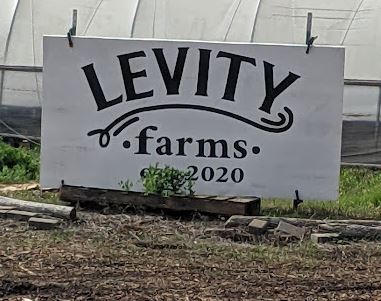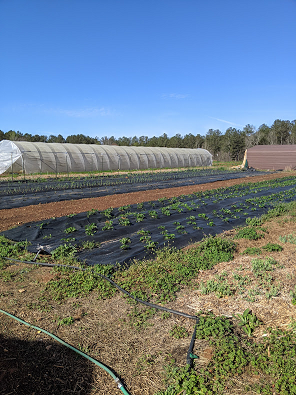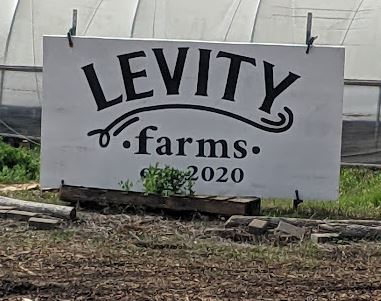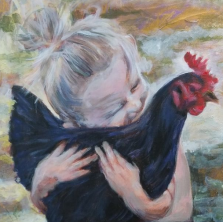We had an onsite introduction to permaculture farming at Levity Farms a couple of weeks ago. This is a little farm near us whose main products are organic vegetables and adorableness. We had the beekeeping workshop there, and they are planning a series of other workshops and events.
This is at the intersection of several things we are interested in. This includes human-scale living and taking advantage of the community and resources near us.

What is Permaculture Farming?
Permaculture farming is a sustainable and holistic approach to agriculture. It aims to create productive, self-sustaining ecosystems that mimic natural systems. This farming system is based on the principles of permaculture, which emphasizes on working with nature, conserving resources, and designing systems that are resilient and regenerative.
Permaculture farming is designed to meet the needs of both people and the environment. This is accomplished by creating food-producing systems that work in harmony with nature. This approach involves observing natural systems, analyzing their components and patterns, and using this knowledge to design productive ecosystems. This makes the system sustainable, low-maintenance, and energy-efficient.
Permaculture farming involves a combination of techniques that include organic farming, agroforestry, animal husbandry, and water management. It incorporates techniques such as companion planting, crop rotation, cover cropping, natural pest control, and the use of compost and organic fertilizers. It also emphasizes on the integration of livestock. This includes chickens and goats, used in the farm ecosystem. This allows them to provide fertilizer, weed control, and other services that benefit the overall system.
One of the key principles of permaculture farming is the concept of “stacking functions. ” This is where each element of the system serves multiple purposes. For example, a tree can provide shade, fruit, and wood for building or fuel, while also improving soil health and sequestering carbon. This approach minimizes waste and maximizes efficiency, resulting in a productive and resilient system.
Permaculture farming has gained popularity in recent years, as more people have become interested in sustainable and regenerative agriculture. It offers a viable alternative to conventional farming methods that rely heavily on synthetic inputs and destructive practices. Permaculture farming can improve soil health, increase biodiversity, sequester carbon, and produce nutritious food while minimizing environmental impact.
Permaculture Farming at Levity Farms
So the proprietors, Zach and Ilana, are escapees from the urban sprawl to our west that have decided to try small scale farming.
The farm itself is a very efficient small scale organic farming operation, with local customers. They are interested in more than the farm, however. They understand and appreciate the importance of community, and want to get together a group of people that are mutually supportive in this effort.
Permaculture Farming at Levity Farms: Livestock
At the moment, they have a couple of flocks of chickens and a few turkeys, guarded diligently by a couple of big noisy white dogs. We’ve been looking for examples of Justin Rhodes-like “chickshaw” model of chicken tractor, and they have two.
In this model, there is a portable chicken building, and a movable electric fence. The chickens don’t get cooped up, which is thought to be healthier, plus they have the opportunity to eat free food in the form of grass.
The idea is to move the whole thing from time to time when they have done their job. The limitation is that you have to keep the chickens’ wings clipped. Also, there is a threat from predators like hawks.
The big chickens in the video below, by the way, are turkeys, for you city slickers.
Permaculture Farming at Levity Farms: Infrastructure
This place has an “eclectic” collection of hoop buildings and greenhouses that they use to start their crops. When we were there, in early March, they had a whole little empire of sprouts of one kind or another.
They also have a pretty sophisticated irrigation system that pumps from a well at the lowest part of the property. This consists of about 8 zones so each of the cash crops can get the water they need. What happens to the veggie scraps? They are turned into chicken feed. What happens to the chickens? They eat the leftovers and give fertilizer.
The whole thing is surrounded by deer fence. There’s a barn/house on the property, which has what they call a “processing room” where they had the workshop. There is a lot of sun and open space, which is in shorter supply than woods in this area.
Crop Selection
The day we were there was the pre-planting stage for some of this stuff, but we did notice that they had a couple of long rows of garlic, and some blueberries and strawberries. This validated the research we did on these crops in the area. They also have a couple of big hills on which there may be pumpkins or watermelons planted at some point. There are also some strawberries growing in tidy rows.
The high level master plan is to continue to distribute to some of the produce to their loyal customers. When they get a surplus, they want to do vegetable boxes, which some customer can subscribe to.

Workshops and Memberships
The master plan also calls for them to offer workshops and other onsite learning opportunities. The beekeeping workshop was the first of these. There are ongoing plans for workshops on food preservation, principles of permaculture farming, and chickens, along with other topics of interest. Our guess is that if you have an old timey skill and would like to share, they would let you.
They’re actually offering “memberships” which is an interesting plan. You get greatly discounted participation in the workshops, access to love and adorableness, and can be part of the little community.
The community idea is openly stated to be minimally commercial. They are much more interested in building relationships. They want to attract people who believe the same way they do about sustainability, respect for nature, and understanding systems.
They’re also tuned into the local homeschool community and want to spread this love of small scale farming to the next generation.
Do-Over
There is a link and some contact information down below.
Would we do this again? Sure we would. This is an interesting place, and Zach and Ilana are gregarious and sharing enough to make it work. The team is working on a schedule of upcoming events, and when they get everything planted that they need to, they can start the workshop series again, and maybe we will link them up.
We’ve studied a lot about this type of operation, and have incorporated some of these things ourselves. So, we love the idea of a place that is taking it to its logical extreme.

Links and References
![]()
